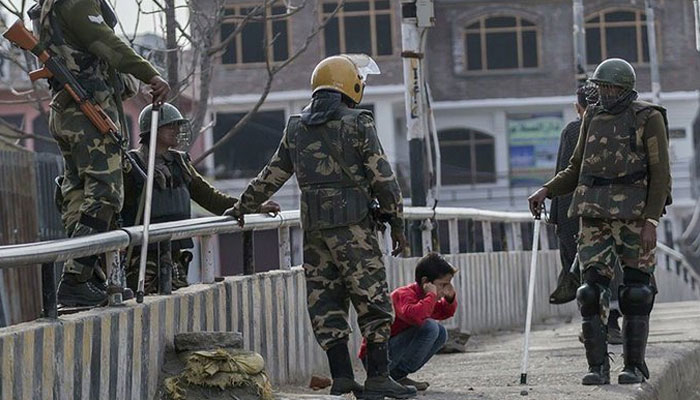Struggle for freedom
Three years ago, India bluntly scrapped Article 370 of the Indian constitution, which provided a special status to the state of [Occupied] Kashmir. This exercise was carried out with remarkable care and skill – one that relied on blocking the flow of information/new from the valley to the outside world. And this tactic has, to some extent, allowed the world to speak less about the Kashmir problem – about the brutal occupation of India’s armed forces and the suppression of Kashmiris. Last week’s killing of three Kashmiri civilians in army custody has again highlighted India’s mindless occupation of Kashmir. The civilians were among eight people arrested after an attack carried out by Kashmiri freedom fighters that had resulted in the death of some Indian armed forces personnel.
Clashes between freedom fighters and the Indian army are common, and the news would not have attracted eyeballs had this been a pre-2019 Kashmir. This is because when the Modi government was unleashing terror in Indian-occupied Kashmir – passing laws that allowed non-Kashmiris to buy land in the valley to somehow turn the region into a Hindu-majority state – it presented the dream of economic growth and empowerment in apparently a terror- and weapon-free region to those who sheepishly criticized Indian aggression. India’s brutal tactics were supposed to be a necessity – a difficult decision that had to be taken to somehow empower the region by bringing settlers from all parts of India to the valley. Right-wing Indians explained that such actions were for Kashmir’s greater good. And after years of suppression, the fact that India has not succeeded in killing the spirit of freedom in the valley shows that military might will never help reach one-sided political goals.
The world’s largest democracy apparently follows the playbook adopted by the ‘only’ democracy in the Middle East, which sees collective punishment – indiscriminately arresting and torturing civilians – as a deterrent. Land grabbers under the guise of independent governments usually see resource-rich regions as an asset that can bring in a good amount of foreign exchange reserves. And as these strategic regions act as prime locations for foreign investors, the occupiers can get some power on the global stage. India has smartly added some apparently ‘pro-freedom fighter’ voices from Kashmir to its group, which has started showing the ‘positive side’ of the occupation. It has turned blind to the suffering of hundreds of thousands of people in the valley, who are still seen as sub-humans. The arbitrary arrests and brutal torture show that India is once again embracing its authoritarian side and using force to silence those who rebel against the occupation. But the occupying entity must realize that over seven decades have passed and the hunger for freedom and liberation is still present in the valley. India’s actions can never help it achieve its goals of full control, but they will forever taint its credentials as a tolerant democracy.
-
 Factory Explosion In North China Leaves Eight Dead
Factory Explosion In North China Leaves Eight Dead -
 Blac Chyna Opens Up About Her Kids: ‘Disturb Their Inner Child'
Blac Chyna Opens Up About Her Kids: ‘Disturb Their Inner Child' -
 Winter Olympics 2026: Milan Protestors Rally Against The Games As Environmentally, Economically ‘unsustainable’
Winter Olympics 2026: Milan Protestors Rally Against The Games As Environmentally, Economically ‘unsustainable’ -
 How Long Is The Super Bowl? Average Game Time And Halftime Show Explained
How Long Is The Super Bowl? Average Game Time And Halftime Show Explained -
 Natasha Bure Makes Stunning Confession About Her Marriage To Bradley Steven Perry
Natasha Bure Makes Stunning Confession About Her Marriage To Bradley Steven Perry -
 ChatGPT Caricature Prompts Are Going Viral. Here’s List You Must Try
ChatGPT Caricature Prompts Are Going Viral. Here’s List You Must Try -
 James Pearce Jr. Arrested In Florida After Alleged Domestic Dispute, Falcons Respond
James Pearce Jr. Arrested In Florida After Alleged Domestic Dispute, Falcons Respond -
 Cavaliers Vs Kings: James Harden Shines Late In Cleveland Debut Win
Cavaliers Vs Kings: James Harden Shines Late In Cleveland Debut Win -
 2026 Winter Olympics Snowboarding: Su Yiming Wins Bronze And Completes Medal Set
2026 Winter Olympics Snowboarding: Su Yiming Wins Bronze And Completes Medal Set -
 Trump Hosts Honduran President Nasry Asfura At Mar-a-Lago To Discuss Trade, Security
Trump Hosts Honduran President Nasry Asfura At Mar-a-Lago To Discuss Trade, Security -
 Cuba-Canada Travel Advisory Raises Concerns As Visitor Numbers Decline
Cuba-Canada Travel Advisory Raises Concerns As Visitor Numbers Decline -
 Anthropic Buys 'Super Bowl' Ads To Slam OpenAI’s ChatGPT Ad Strategy
Anthropic Buys 'Super Bowl' Ads To Slam OpenAI’s ChatGPT Ad Strategy -
 Prevent Cancer With These Simple Lifestyle Changes
Prevent Cancer With These Simple Lifestyle Changes -
 Air Canada Flight Diverted St John's With 368 Passengers After Onboard Incident
Air Canada Flight Diverted St John's With 368 Passengers After Onboard Incident -
 Experts Reveal Keto Diet As Key To Treating Depression
Experts Reveal Keto Diet As Key To Treating Depression -
 Inter Miami Vs Barcelona SC Recap As Messi Shines With Goal And Assist
Inter Miami Vs Barcelona SC Recap As Messi Shines With Goal And Assist




